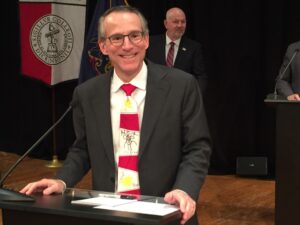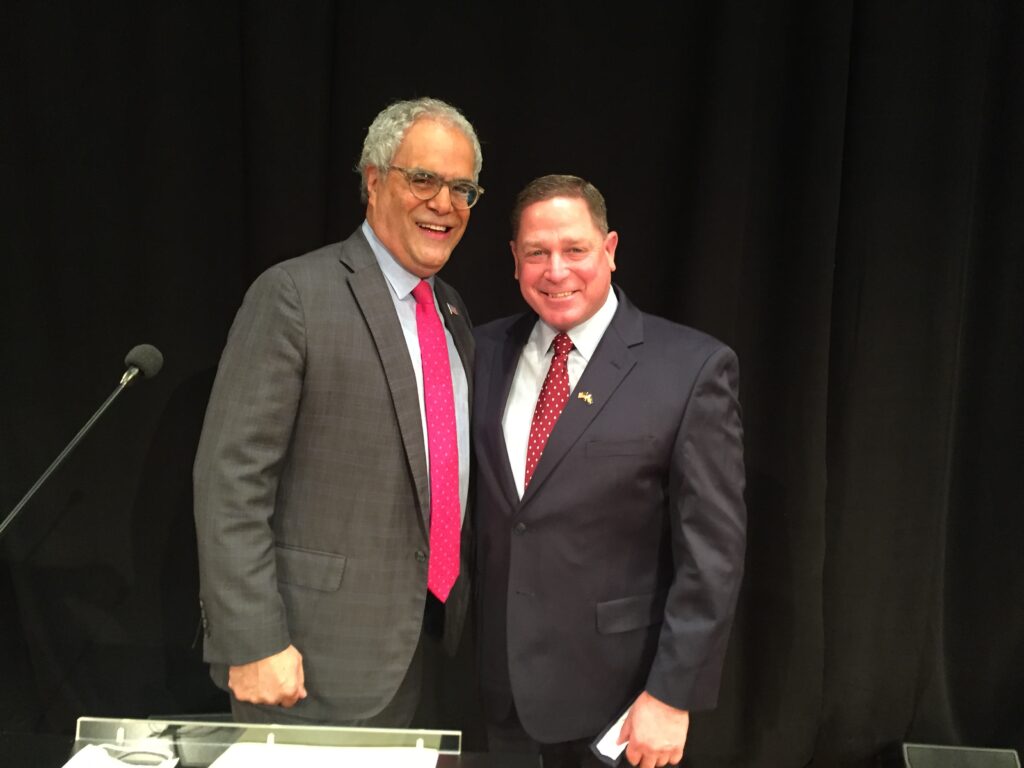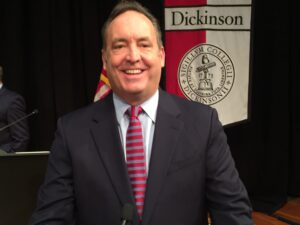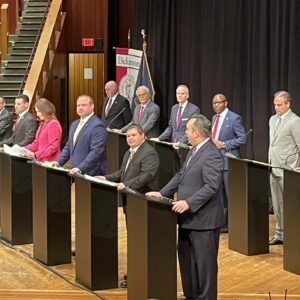Twelve Republican men and one woman, vying to be their party’s nominee for governor, debated on a crowded stage at Dickinson College in Carlisle Wednesday evening. And as big as the debate field was, at least two other candidates didn’t attend.
It was the first chance for the baker’s dozen to make the case for their candidacy to Republican voters. Former Congressman Lou Barletta, who is leading in the polls, was a no-show. State Sen. Doug Mastriano of Franklin County is expected to formally enter the race Saturday.
The mostly collegial affair showed the contenders agree on many big issues, such as reducing taxes and regulations; embracing the state’s fossil fuel industry as a way to bring good jobs and prosperity to the state; and improving education and school choice. The exception was criticism of the two sitting lawmakers for their votes for Act 77, which allowed mail-in ballots.
When asked about people leaving the state for opportunities elsewhere, West Chester native Bill McSwain, the Trump-appointed U.S. Attorney for southeastern Pennsylvania, played to his strong suit: law and order.
“We can’t be competitive without public safety,” said McSwain. “Because businesses simply aren’t going to invest in high crime areas…While I was U.S. Attorney I protected the community and its businesses by putting rioters and looters and arsonists in jail two summers ago when they tried to destroy Philadelphia…I am the only candidate in this race with law enforcement experience.”
McSwain also burnished his outsider credentials.

Guy Ciarrocchi
“We are never going to have change in Pennsylvania if we have a career politician as governor,” said McSwain. “And there are a number of career politicians on this state tonight. Instead, we need an outsider. Somebody who owes nothing to the Harrisburg swamp. That is who I am. I’ve run for office before. I’m a conservative outsider. I’ve lived a life of public service as a Marine and a prosecutor. I know how to get things done…The bigger our government, the less money people have to put in their pocket.”
Former Congresswoman Melissa Hart entered the race just days before the debate. She said the state has lost people, lost congressional seats, and lost clout in Washington, D.C.
“We have a bureaucracy that cares more about their sustenance than the people of Pennsylvania’s sustenance,” said Hart, of Bradford Woods. A lawyer, she promised to work with the legislature to change that and noted she has experience in both state and federal government.
Hart also agreed the state should use its natural gas, saying its production has helped the state’s farmers.
“Natural gas is a clean-burning fuel,” she said.
Hart promised to build coalitions to get things done, saying she was elected three times to the state Senate from a district with more Democrats, as well as to Congress, with Democratic voters’ support.
“What’s important is what their real concerns are,” she said. “Education is one.”
Later in the debate, Hart mentioned women have been the slowest to return to work from pandemic shutdowns because of school closures and uncertainty.
“We need to get teachers back in the classrooms,” she said, and “prevent our children from being used as pawns.”
She called for “responsive government” and “sensible laws.”
Guy Ciarrrocchi, a Chester County resident who grew up in South Philadelphia and is on leave from his job as president and CEO of the Chester Chamber of Business and Industry, summed up the state’s current situation.
“It’s as if Harrisburg has wanted us to fail,” he said. “We have more assets than any other state, from agriculture to life sciences. We’re sitting on more energy than most nations…There is no reason we’re not a top 10 state. We should never be a bottom 10 state…We should have a simple rule: if a bill creates jobs we’re for it. If kills jobs, we kill the bill.”
Pennsylvania is “sitting on more energy than most nations on the planet,” said Ciarrocchi. “We’re duty-bound to do it. We need to get it out of the ground and into our homes and schools, not just to attract businesses but to keep the businesses we do have.”
Ciarrocchi was part of a coalition of business people, parents, and residents who fought for the Vote Yes campaign in the 2021 primary to get ballot initiatives passed.

Charlie Gerow and Dave White
“We need school choice. I am a Chamber CEO who is passionate about education. We need to reform education,” Ciarrocchi said. “Education is the most important issue. Thousands of children are waiting on lists to go to charter schools and thousands of others are stuck in failing public schools.
“We need to bring about a coalition to bring about school choice. We need to rescue those kids and empower their parents,” he said.
Montgomery County Commissioner Joe Gale blamed Gov. Tom Wolf and the Republican-majority legislature for the state’s population drain. He claimed to be the only candidate who can beat “radical liberal, Josh Shapiro,” the presumed Democratic candidate.
Gale agreed the state should use its energy resources and said tax money generated from fracking should stay in the regions where the gas is extracted and not go to Philadelphia or Pittsburgh.
Gale said he is for voter identification and election reform, as well as school choice. “In my opinion, anyone that voted for the devastating Act 77 legislation should be disqualified from holding office, let alone being promoted to higher office,” said Gale. “We have to fix (the election system) and I’ll get it done.”
“I will be a pit bull in Harrisburg and hold the Republicans accountable to get the job done,” he added.
Retired business executive and author John Ventre joined in the criticism of Act 77, which was supported by two other Republicans in the race, state senators Jake Corman and Scott Martin.
Ventre criticized the politicians “who voted for Act 77 that cost the best president in my lifetime to lose Pennsylvania. There are three types of candidates: You have your politician who wants to advance himself and is an insider. You have your Romney RINO, who wants to negotiate with the left…The person that’s going to win this election is going to be a Tea Party Patriot.”
Ventre also blamed the state’s treatment of businesses for the population loss. “I want to hear a sucking sound from the northeast as jobs come to us,” the Hempfield resident said. “I want to make Pennsylvania the Texas of the northeast.”
Delaware County resident Dave White, a small business owner, and former county councilman said the state not only needs lower taxes and reduced regulation but also to shorten the time needed to get permits.
White agreed the state has a wealth of natural gas “under our feet” that should be utilized. As a former pipefitter who is now a business owner, he backs pipeline construction “as the safest way to have this product transported.”
“I will make sure we are the energy capital of the United States,” White said, noting that pipeline jobs pay $80,000, $90,000 or more.
“If you want to get things done, send somebody who is a results-oriented businessman to get things done,” said White. “In (the legislature) they are spending other people’s money. They need to start acting like their own money.” White promised to review regulations and departments and get rid of those that are not needed.
Charlie Gerow, a Republican strategist based in Harrisburg, said that he is the one who can get things done.
“Economic competitiveness” will keep young people in Pennsylvania, he said. Gerow favors lower taxes and sensible regulation, along with “cleaning up public corruption because job creators are not coming to Pennsylvania with their opportunities if they believe they have to pay to play.”
Regarding Wolf’s handling of the pandemic, Gerow said he would model the policies of Florida Gov. Ron DeSantis and South Dakota Gov. Kristi Noem that put individual freedom first, rather than the “disastrous policies of Tom Wolf.”
He would also propose a ballot measure to allow the voters to “remove any governor who thinks he’s a king.”
Dr. Nche Zama, a cardiothoracic surgeon from the Poconos, said Pennsylvania’s business tax policies are “suffocating businesses,” he said. And the state which spends “billions on education was the largest exporter of graduates. We need to embrace those graduates so they stay here.”
Zama also supports using fossil fuels, saying, “Windmills, as we know them, are not ready to run our massive industries in Pennsylvania…” European countries have recently “ratcheted up their use of coal and gas.”
As a leader in the health care industry, “I know how to bring people together. I’ve done it in healthcare. A leader is somebody who absorbs uncertainty and somebody who inspires.”
“Pennsylvania needs a leader who is a compassionate critical thinker,” said Zama. “And I can be that person.”
Jason Richey, said the Pittsburgh area has seen “dramatic losses of population over the last 50 years.” The father of three sons, he said, “I want to keep those boys here.” He proposed a plan for zero percent income tax and shrinking the cost of government.
An energy and construction lawyer, Richey said he is an expert and the state sits on “an ocean of natural gas.”
His energy plan would create 50,000 new jobs, he said, and “get the whole commonwealth working together.” That would improve the environment and improve national security, he noted. He would also get rid of Act 77 and the 50 days of mail-in ballots.
Former Corry mayor Jason Monn, who owns a restaurant, said he has kept his employees working throughout the pandemic but there are “a lot of businesses that don’t love Pennsylvania because of our taxes, because of our regulations.”
“I am a firm believer it’s the government’s job to facilitate progress, not to dictate how to do it,” said Monn.
“As a business owner, I have a lot of what politicians don’t have, that’s common sense,” said Monn. “We need to learn to take safe risks. We can do things the proper way and not be ridiculous about them.” When pipeline workers have money they can then come to places like mine. It’s a trickle-down effect.”
During the pandemic, Monn and his wife came up with a plan to give free meals to kids. With the help of others, they distributed 31,000 meals in three months.
State Sen. Scott Martin (R-Lancaster) noted the state’s “fastest-growing age demographic is 85 and above.” States like Florida and the Carolinas have “pro-growth policies” while “we have one of the most onerous regulatory and tax climates in the country.”
On the energy industry, Martin opposes Wolf’s plan to impose a “half-billion-dollar carbon tax” on the state and raise gas prices by 18 percent.
“The moment Pennsylvania decides to embrace and grow this industry, the better off we’ll be,” he said.
The state needs “courage and a bold agenda.” Martin was warned not to eliminate government agencies because he would not be elected again but he did and was reelected. The state teachers union has run ads against him, as well. If elected governor, he plans to work with the general assembly to devise a “pro-growth, pro-family” agenda.

Sen. Jake Corman
State Sen. Jake Corman (R-Centre) has three children who will soon make decisions about what to do with their lives and where to live. He hopes to keep them in Pennsylvania. But “this governor has used our tax money as a way to punish employers. I am going to use our tax code as a way to inspire growth.”
Regarding the pandemic, Corman said he worked with others in the legislature to rein in Wolf’s powers through ballot questions that voters approved, and he filed and won a case unanimously in the state Supreme Court against the Wolf administration over the ability of the state to impose mask mandates.
“Tom Wolf’s scorched earth is not the way to govern,” said Corman.
Asked about building a coalition, Corman said he is “there to get things done” and he would be a governor who can work with the legislature.
Another business owner, Shawn Berger said the state’s unemployment program is a problem.
“Get people back to work and cut unemployment,” said Berger, a Lehigh Valley businessman who owns two enterprises.
During the pandemic shutdowns “I had employees come to me in tears. I said, ‘We’re going to stay open. We’re going to make this work.” He fought the Wolf administration and kept his business open, he said.
And as a business owner, Berger said, he knows how to stay within his budget and not “overspend.” Berger also favors the decriminalization of marijuana.
Follow us on social media: Twitter: @DV_Journal or Facebook.com/DelawareValleyJournal

